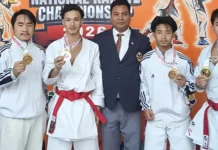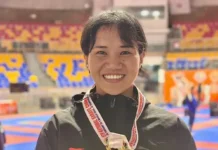[ Tongam Rina ]
It is too early to know whether United Tani Army chair Anthony Doke is a pawn of the state, to be used and discarded, or if he is a forgotten criminal trying to make a comeback by leveraging emotive and contentious issues like hydropower, tribal rights, and Taniland. Either way, for now, he is keeping social media busy, with many wanting to know more about him. While a large section remains unaware of his past, many know him as a criminal with over two decades of involvement in crimes ranging from arms smuggling to extortion.
The state would be making a mistake if it dismisses Anthony Doke as just another criminal. Whether he is a tribal or not is irrelevant at the moment. The fact is he has taken up arms in the name of the Tani tribes -the five largest tribes in Arunachal who trace a common origin – and claims to be one of them. His access to weapons and training should be a cause for concern.
Is he a prop being used by state actors to meet their own ends? The Indian state does have a legacy of propping up such figures in the region. Keeping everyone engaged and entertained has been the mantra of state actors for many states. Also, the far-right media narrative that portrays him as a mouthpiece for the anti-mega dam movement in the state, or even as a Chinese agent, points to many possibilities. In close proximity to the state, the right-wing media, or, for that matter, a section of the mainland media, spins narratives to keep people occupied and help the state forward its agenda. Times are such that the party in power controls almost everything and everyone.
It is also hard to believe that no one in the intelligence kept track of Doke, considering that the National Liberation Council of Taniland was not only attempting to ‘liberate’ the Tanis but was also a major nuisance as extortionists when it was active. Some of the top bosses in the current Arunachal police know about his antecedents.
Moreover, various earlier underground organisa-tions in Arunachal had links, one way or another, with Naga underground organisations operating from Myanmar. Doke is reported to be with the K-YA faction of the NSCN (Khaplang), led by Yung Aung, the nephew of SS Khaplang, the founder of the K faction.
If we go back in recent history, we can recall that one of the biggest homegrown NSCN leaders was Chapo Menon. He was feared not only for his capacity for violence but also for his knack for recruiting young people from Tirap, Changlang, and Longding to join the Naga freedom movement. At his peak, he was seen as a powerful leader of the NSCN (K) and had politicians at his beck and call well into the early 2000s, before he was executed for alleged treason by a rival faction. During that turbulent period, when the NSCN (IM) was making inroads in the three districts, which was under the powerful grip of the NSCN (K), it was widely believed that politicians, businesses, and both state and non-state actors exploited various factions, only to become pawns in the hands of warring groups.
Later, when these groups began to dictate politics, the Arunachal Pradesh Control of Organised Crime Act (APCOCA) was introduced by the Mukut Mithi government in 2002. The Act was largely aimed at controlling the growing influence of the NSCN in the state. Many saw it as a weapon used by the state to silence opposing voices, which led to protests by students, underground groups, and certain political groups. It was similar to today’s Arunachal Pradesh Unlawful Activities (Prevention) Act, 2014 (APUAPA), an Act that empowers the state to detain anyone deemed an opponent of the state. The state may not wish to relive those tumultuous years of politics, but it’s important to learn from history and recognise how things unfolded.
It remains to be seen whether Doke is a tool of state power or just a remnant of past crimes, or a leader who still holds sway over certain segments of the population.
We should not forget that, as hardened as he is, Doke, whatever direction he takes, will be more than just a nuisance. He tried to reintegrate into society as a restaurateur but soon returned to picking up weapons. After serving jail time, it’s clear which path he prefers.


